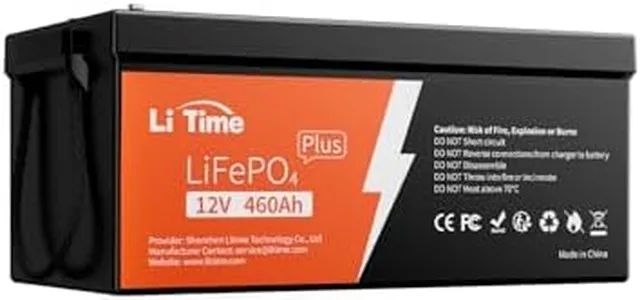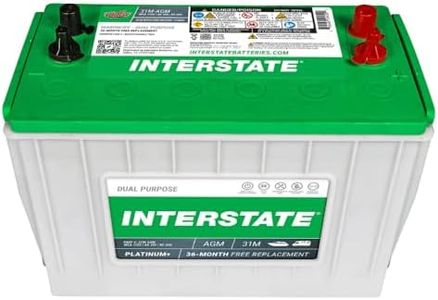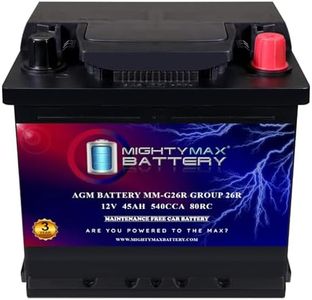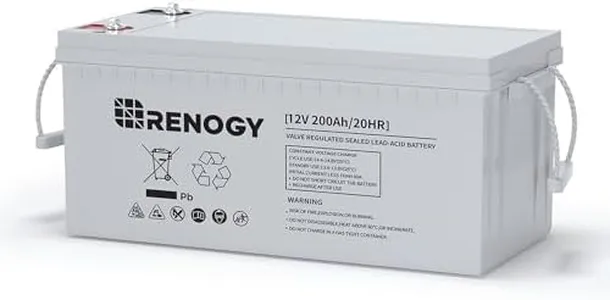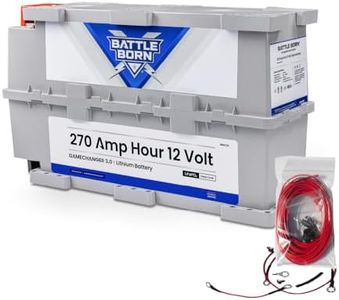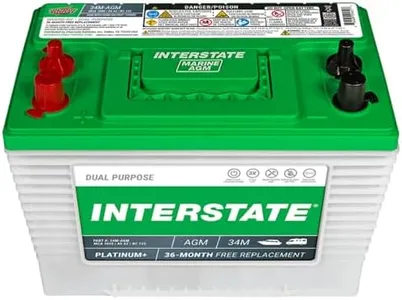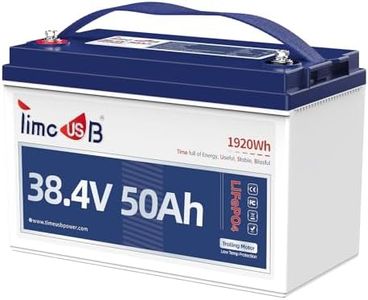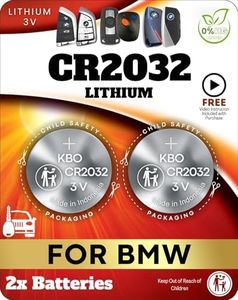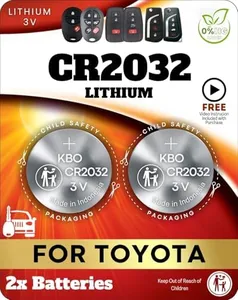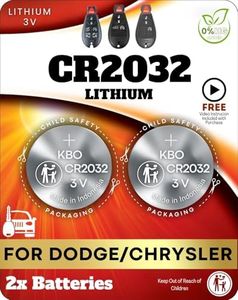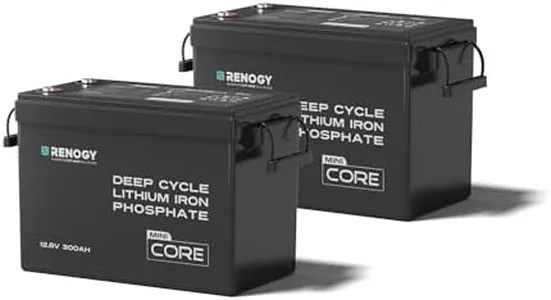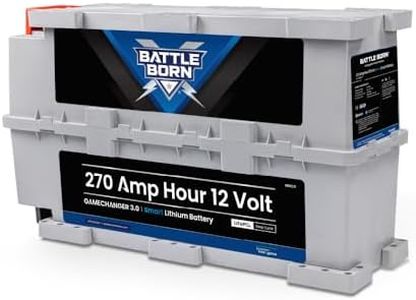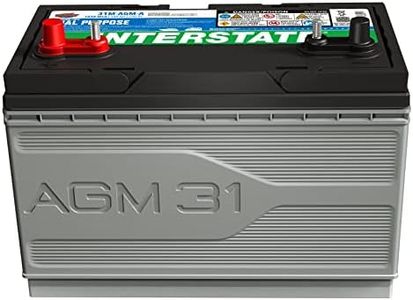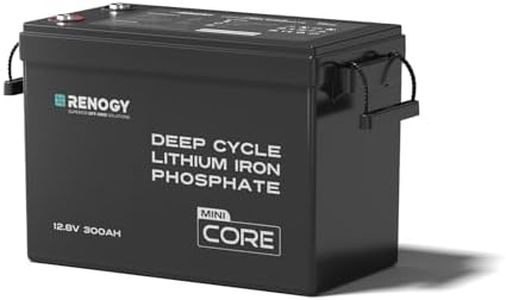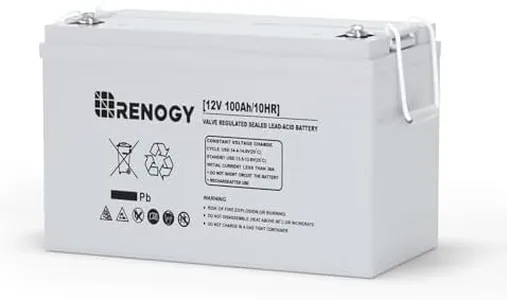10 Best Marine Batteries 2026 in the United States
Our technology thoroughly searches through the online shopping world, reviewing hundreds of sites. We then process and analyze this information, updating in real-time to bring you the latest top-rated products. This way, you always get the best and most current options available.

Our Top Picks
Winner
Interstate Batteries Marine/RV Battery 12V 100Ah 925CCA (31M-AGM) Dual Purpose Power Pure Lead AGM RV & Marine Starting Replacement Battery (Group Size 31M) Boats, RV's
Most important from
82 reviews
The Interstate Batteries Marine/RV 12V 100Ah battery is a dual-purpose battery designed for boats and RVs, capable of both starting your engine and providing power to accessories like lights and pumps. Its pure lead AGM (Absorbed Glass Mat) technology offers a longer lifespan than many traditional batteries, lasting 2 to 3 times longer than flooded types, and recharges faster, which benefits frequent boat or RV users.
With 925 Cold Cranking Amps (CCA), it delivers strong starting power even in cold weather, and its 100Ah capacity allows it to supply steady power over longer periods, supporting electronics and trolling motors without quickly running out. The Group Size 31M fits many standard marine and RV battery compartments. It is relatively heavy at around 72 pounds, so handling might require some care. Maintenance is low since AGM batteries are sealed and don’t need water refills, making them convenient for boaters and RVers who prefer hassle-free batteries. It is also built tough to resist vibration and shocks common in marine environments, helping it endure rough conditions.
Users recognize it as a premium option with a price to match, and while it has a solid reputation, it is not the top seller in automotive batteries, likely reflecting its niche market or competition. For those seeking a reliable, long-lasting battery capable of handling both starting and deep cycle uses with minimal upkeep, this Interstate battery is a strong choice, especially if durability and performance on the water or road are priorities.
Most important from
82 reviews
Mighty Max Battery MM-G26R BCI Group 26R 12V 45AH, 80RC, 540 CCA, Rechargeable SLA AGM Battery
Most important from
909 reviews
The Mighty Max Battery MM-G26R is a 12V AGM (Absorbent Glass Mat) battery with a 45Ah capacity, making it suitable for small to medium marine vessels requiring reliable power. Its 540 Cold Cranking Amps (CCA) provide strong starting power in cold or rough weather, which is essential for boat engines. The 80-minute Reserve Capacity (RC) supports longer run times, allowing it to keep accessories powered if the engine isn’t running. Its sealed, spill-proof design eliminates maintenance worries such as topping up water, and the AGM technology helps it recover well from deep discharges.
Measuring 8.38 x 6.88 x 7.56 inches, the battery fits standard group 26R compartments and is easy to install with included mounting screws. It features rugged, vibration-resistant construction designed to handle tough marine conditions including shocks and varying temperatures. Although it is somewhat heavy at about 35.7 pounds and does not include wire harnesses or additional mounting accessories, these can be purchased separately. The battery supports multiple mounting positions but cannot be installed upside down.
The Mighty Max MM-G26R comes with a 3-year warranty and is manufactured in an ISO-certified facility adhering to CE safety standards, reflecting good quality. This battery represents a reliable option for boaters seeking dependable starting power, reasonable capacity, and low maintenance. For larger vessels or extended power needs, higher capacity batteries may be more appropriate.
Most important from
909 reviews
Renogy Deep Cycle AGM Battery 12 Volt 200Ah, 3% Self-Discharge Rate, 2000A Max Discharge Current, Safe Charge Most Home Appliances for RV, Camping, Cabin, Marine and Off-Grid System, Maintenance-Free
Most important from
1121 reviews
The Renogy Deep Cycle AGM Battery is designed to meet the needs of marine and off-grid users, making it a solid choice for applications like RVs, camping, and cabins. One of its key strengths is that it's maintenance-free, featuring advanced AGM technology that prevents acid leakage and eliminates the hassle of regular upkeep. With a battery capacity of 200Ah and a maximum discharge current of 2000A, it offers excellent discharge performance, suitable for powering a variety of home appliances safely.
Additionally, the battery has a low self-discharge rate of just 3%, which is particularly beneficial for users who may not need to use the battery frequently. This feature ensures that the battery retains its charge for extended periods, making it reliable for off-grid situations.
The wide operation temperature range enhances its durability, allowing it to perform well even in cold conditions below freezing. This is an advantage for marine users who may encounter harsh weather.
Most important from
1121 reviews
Buying Guide for the Best Marine Batteries
Choosing the right marine battery is crucial for ensuring your boat's electrical systems run smoothly and reliably. Marine batteries are designed to withstand the harsh marine environment and provide power for starting engines, running electronics, and other onboard equipment. To make an informed decision, you need to understand the key specifications and how they relate to your specific needs. Here are the main factors to consider when selecting a marine battery.FAQ
Most Popular Categories Right Now
